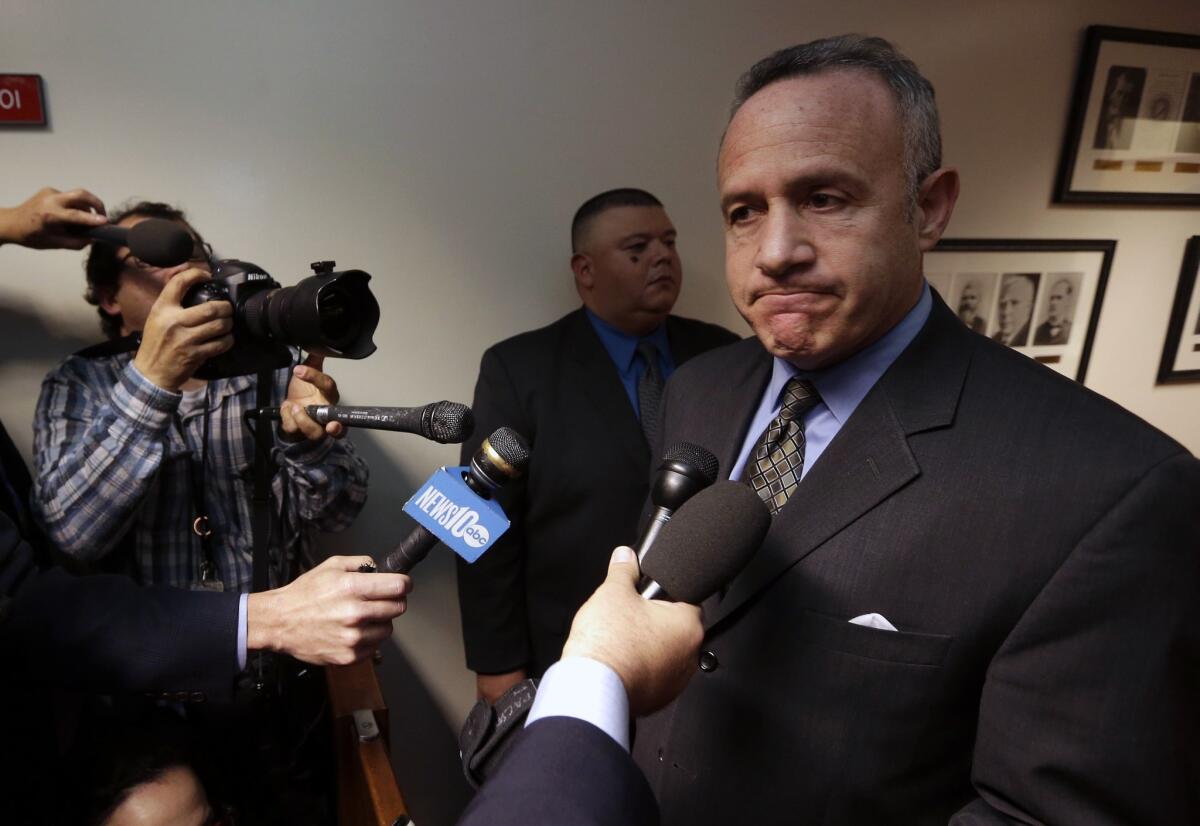Window opens to curb legal corruption

- Share via
SACRAMENTO — The most shameful habit of California legislators arguably is their annual summer shakedown of lobbyists. But it finally may be ending, at least in the Senate.
Senate leaders — rocked by the corruption scandals of two fellow Democrats — are hoping to quash the unsavory practice of coercing campaign contributions from special interests while high-stakes bills are pending in the Capitol.
Outgoing leader Darrell Steinberg (D-Sacramento) and his designated replacement, Sen. Kevin de León (D-Los Angeles), intend to push for a Senate rule banning peak-session fundraising, according to sources who asked not to be identified because they aren’t ready to officially announce the landmark move.
Tentatively, the plan is to black out fundraising starting in late May, when budget negotiations kick into high gear, until the harried end of the legislative session around Labor Day. The ban would be lifted during a four-week vacation recess in July.
“We want to stop people from raising money when they should be focused on the public’s business,” one source says.
That reason is good enough. But there’s also a more important one: PR. The current system portrays an ugly image and emits a rotten stench.
When a legislator leaves a Capitol committee room or house chamber where he has been casting deciding votes — with many more to come — and walks across the street to a watering hole to hold a fundraiser attended by lobbyists, it just plain stinks. But it has been happening for decades.
August is notorious. There may be a dozen fundraisers scheduled each day the Legislature is in session, acting on hundreds of bills within hours.
It’s legal corruption.
By law, legislators and donors cannot discuss legislation while checks are being written. That could be construed as a quid pro quo and bribery. But these are political pros who understand the body language of subtle shakedowns.
I’ve heard of legislators who allow lobbyists into their offices to discuss legislation. Then when the lobbyists leave and walk down the steps of the Capitol, their cellphones jingle and the lawmaker is reminding them of his upcoming fundraiser. Lobbyists legally can’t donate, but they routinely arrange for their employers and clients to.
“The lobbyist worries that he better contribute to the fundraiser because if he doesn’t, the [legislative] member is going to vote against him,” says longtime lobbyist George Steffes. “They all deny that. Legislators certainly do. But I know damn well that’s why they’re having fundraisers in August.”
Legislative insiders explain privately that the peak legislating period is when lawmakers enjoy their maximum leverage over special interests. It’s also when Sacramento looks the slimiest.
Steinberg and De León intend to ask the Senate to adopt a house rule imposing the fundraising blackout. Although breaking the rule wouldn’t be a crime, it could be enforced by the Senate itself. Violators could lose committee chairmanships or be yanked off panels, be uprooted to smaller offices or lose staff.
With a simple rules change, the blackout can be imposed this summer. It would be better to pass a bill and create a new law. But the Senate leaders want to avoid hassling with the Assembly and Gov. Jerry Brown.
One lawmaker, however, is pressing for legislation. Sen. Alex Padilla (D-Pacoima), a candidate for California secretary of state, has a bill to require a fundraising blackout from 100 days before the session’s end to one week afterward.
“The most important votes of the year happen in the last days of a session,” Padilla says. “Even if the fundraising is done on the up and up, there’s a perception it influences decision making in the Capitol and that should be addressed.
“There are plenty of other times in the year to do fundraising.”
Outside the Capitol, another secretary of state candidate, Dan Schnur, an independent, has been beating the drums for a much longer fundraising blackout. He wants to outlaw it whenever the Legislature is in session — at least seven months a year.
“A partial ban on fundraising is like quitting smoking on Mondays, Wednesdays and Fridays,” says Schnur, a former Republican strategist turned reform advocate. “It doesn’t accomplish very much at all.”
Well, yes it would. It would eliminate the most tasteless money grubbing.
Politicians do need to raise money. It costs, on average, $1 million to run for the Senate. And most of that comes from special interest investors seeking favors in the Capitol.
It’s unseemly. But the alternative is public financing of campaigns — the politicians being bought by the public instead of private interests. The public, however, objects to its tax money going to politicians. And Supreme Court decisions over the years — the latest last week — make public financing impractical anyway, because there’s an ocean of private money flowing.
The Senate scandals — FBI corruption stings nabbing Sens. Leland Yee (D-San Francisco) and Ronald S. Calderon (D-Montebello) — have suddenly opened a window of opportunity for modest reform.
Several bills are wending through the Capitol.
Brown last week signed one increasing the power of the state Fair Political Practices Commission to investigate campaign finance skulduggery.
There are some bills moving that would shine a brighter light on contributors, identifying them more quickly.
“If money is speech, we should know who’s speaking to us,” says Loyola Law School ethics professor Jessica Levinson, referring to a U.S. Supreme Court decision that political money is protected by the 1st Amendment.
“When people donate money, they want something in return.”
Too often in Sacramento, they want a legislator to walk back across the street and vote for their bill. The lobbyist has been shaken down and the lawmaker legally bribed.
More to Read
Sign up for Essential California
The most important California stories and recommendations in your inbox every morning.
You may occasionally receive promotional content from the Los Angeles Times.











